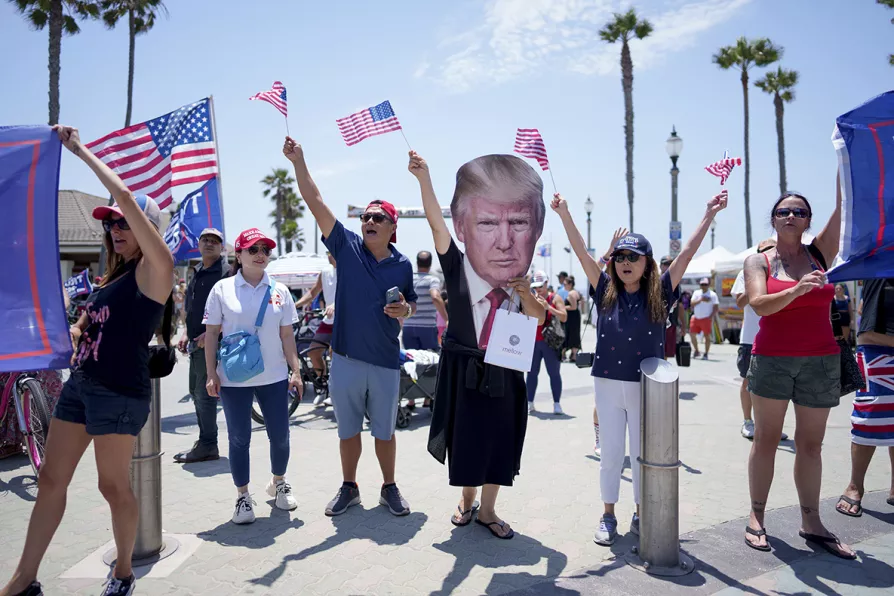
 People rally in support of Republican presidential candidate former US President Donald Trump in Huntington Beach, California, July 14, 2024
People rally in support of Republican presidential candidate former US President Donald Trump in Huntington Beach, California, July 14, 2024
THE Secret Service did their job and the man who drew first blood from Donald Trump is dead. We will never know for sure what combination of factors pulled his trigger but we do know that they germinated in the corrupt political culture of the imperial hegemon.
For the entirety of its existence, getting on for two centuries, Americans have reshaped their conception of weapons from objects with a utilitarian value — admittedly in the first instance to clear the land of its indigenous people and many of its animals — to become a fetish.
In a country where there are more guns than people this is a field replete in opportunities for psychological speculation and academic enquiry. One compelling strand locates the genesis of the perverted US love affair with guns in the anxieties brought about in the minds of white Southerners by the emancipation of slaves.
Today, it is argued, this has metamorphosed into a firearm fetish whereby these weapons are possessions that cannot be separated from their sense of self.
We can only hope that North Americans who refuse this identity become a political majority in the land they have made their own.
Trump is markedly more lucky than the uncounted children killed in school shootings or people gunned down in drug wars and, by a greatly enhanced metric, those unfortunates whose lives have been sacrificed to the US war machine in the contested global hegemony of the dollar.
Enormous hypocrisy attends the subject of assassination in US political culture. For a country founded on the genocide of its indigenous people, the taking of a single life for political purposes is a routine part of executive decision-making.
Fidel Castro and the super efficiency of Cuba’s intelligence services turned the uncounted attempts on his life into a joke.
Patrice Lumumba never got to make a joke about his death while the sainted Barack Obama established a presidential record in weekly authorising drone missile attacks on the social gatherings of Afghan targets.
An integral part of US strategy in its war on Vietnam was the CIA’s Phoenix programme of assassination.
Less anyone think this political tool is exclusively deployed in the Third World, recollect that US intelligence was involved in the post-war attempt on the life of the Italian communist minister Palmiro Togliatti and succeeded in 1950 in killing the Belgian communist leader Julien Lahaut.
Those elements in the US ruling class who want Trump elected have been given an iconic image with which to contrast their man’s now heroised figure to the fumbling imbecilities of Biden.
If the Democratic Party continues in its endorsement of Biden, himself a long-time executive in the US’s never-ending imperial wars, it will facilitate Trump’s election unless some other agency does a better job than the man whose “head was blown off” this last weekend.
Whatever the mix of subjectivities which drove this man the factors which set in train this sequence of events lies in the cognitive dissonance we find in the US ruling class over both foreign and domestic policy that reflects the economic crisis factors that underpin Trump’s appeal to US voters, especially working-class voters.
Where he articulates the incoherent but immense anxieties about the decline of US manufacturing he also expresses, in contradictory ways something of a challenge to the main thrust of US foreign policy.
The resolutions of these contradictions will be expressed either in his defeat in the presidential election, in an accommodation with the dominant section of the US corporate elite, or, if this proves impossible, some other measure, more efficient than this assassination attempt, to negate any challenge he offers.

There is no doubt that Trump’s regime is a right-wing one, but the clash between the state apparatus and the national and local government is a good example of what any future left-wing formation will face here in Britain, writes NICK WRIGHT













